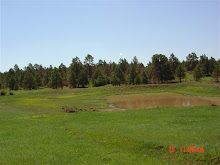Colorado: A Clean Energy Future Done Right
You rarely hear people acknowledge the drawbacks to natural gas when talking about replacing coal but I think this article does a pretty nice job.
Elise Jones.Executive Director of the Colorado Environmental Coalition
Posted: April 28, 2010 11:48 AM at The Huffington Post
Once again, many eyes are on Colorado as it pioneers a ground-breaking pathway towards a cleaner energy future. And they should be.
Last week Colorado signed into law its historic Clean Air-Clean Jobs bill, which calls for transitioning the aging, coal-fired power plants in the Denver metropolitan area that are putting the health of the area's children, elderly and sick at risk. In addition to reducing ozone and regional haze pollution, this measure aims to decrease the greenhouse gas emissions contributing to global warming, the impact of which is already evident in Colorado's early-melting snowpack and the bark beetle epidemic ravaging our forests.
This bipartisan legislation enjoyed a diversity of supporters: Governor Ritter, Xcel (the affected utility and Colorado's largest), climate-concerned legislators, and many conservation groups, as well as rural lawmakers and natural gas companies who were delighted that much of the replacement energy from these coal plants is likely to come from natural gas (in addition to renewables and energy efficiency).
While Colorado's landmark progress in shuttering pollution-belching coal plants is a great example for other states and Congress to follow, it's important first to understand the context for this success story. Our remarkable progress towards embracing a new energy future involves a comprehensive package of energy policies - and all parts are equally important.
One of the key factors to the success of the clean air legislation was its alliance of strange bedfellows - but let's be clear, not everyone was comfortable with the sleeping arrangement. And that's because while natural gas burns cleaner than coal, it's not clean. A flight over parts of Colorado's West Slope will starkly illustrate the impacts of past natural gas production: an industrialized web of bulldozed well pads, pipelines, compressor stations, roads and waste pits carved into our scenic landscapes. For the people who live in the "gas patch" - the families whose drinking water has been contaminated, the ranchers who have lost pastures to well pads, or the landowners whose property values have plummeted with the presence of drill rigs in their backyards - fuel switching to natural gas to clean up Denver's air is not the easiest pill to swallow.
Consequently, ensuring that natural gas production is "done right," using new technologies and improved management practices to reduce impacts, is an essential part of the equation. Indeed, the Clean Air-Clean Jobs bill would not have happened had Governor Ritter and state lawmakers not shown bold leadership in 2009 in updating the state's rules guiding oil and gas drilling to increase protections for our drinking water, wildlife habitat, and communities. Among other things, these common sense measures direct new drilling away from municipal water supplies, require extra care in important wildlife areas, and require companies to disclose the toxic chemicals they use in the drilling process in case accidents or spills occur. More>>>






0 comments:
Post a Comment